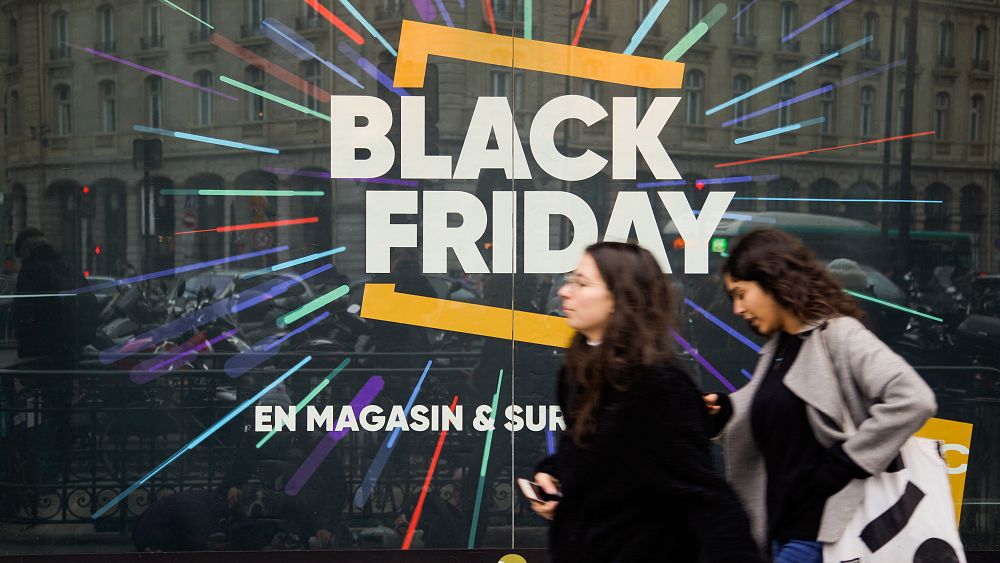There may be fewer bargains and more scams than you think. How to avoid falling into Black Friday traps? Euronews Business looks into the matter.
Black Friday sales are in full swing but be careful, “there would be more misleading sales than real discounts“, warns Grégory Caret, director of UFC-Que Choisir, the observatory of the main consumer association in France.
The recent UFC-Que Choisir investigation showed that, as in previous years, false promotions are proliferating. Experts told Euronews Business that real discounts are exceptional during Black Friday sales.
Merchants are required to display the lowest price in the last 30 days since the entry into force of the European Omnibus directive, intended to improve consumer protection. A measure that some traders circumvent.
A manipulated reference price
The greater the reduction, the more vigilant you must be: “If you see a 50%, 40% discount, you need to understand that it is probably a fake promotion: the retailer is manipulating the reference price to make people believe that they are buying at the best sale price with a huge promotion“, adds Grégory Caret.
Retailers can increase the reference price before Black Friday.
Let’s take the example of this washing machine: “The price of 349.99 euros was only applied from October 18, for a promotion which took place on November 13, barely 30 days later. The trader could therefore not take this price as a reference“, indicates UFC-Que Choisir in its report.
Another deceptive practice used by merchants to make you believe you are getting a good deal is to display competitors’ highest comparison price or the manufacturer’s suggested retail price rather than the original price: “Reference prices that you will never find in stores“, adds Grégory Caret.
“It is impossible to tell the difference: you have a crossed out price, then a percentage in both cases. A higher reference price, a greater reduction and a stronger incentive to purchase“, comments Olivier Gayraud, lawyer for the CLCV consumer association.
“But these reference prices may never have been used before Black Friday“, he adds.
The consumer association found that prices were not significantly lower than in the weeks before and after Black Friday. In the vast majority of cases, merchants have chosen a flattering comparison price for their items. “And all products are affected by these deceptive practices“, notes Olivier Gayraud.
Online scams: don’t fall for them
Beware of scammers looking to make money during Black Friday. This is the perfect opportunity for scammers to try to sell you products that don’t exist.
“There is a surge in scams during Black Friday as fraudsters have a higher success rate“, observes Jérôme Notin, head of Cybermalveillance.gouv.fr, the French platform for assistance to victims of cybermalveillance.
Barclays has issued an urgent warning, revealing a 22% rise in money lost to scams during last year’s Black Friday and Cyber Monday sales. Victims lost an average of 970 pounds sterling (around €1,100).
One of the most common shopping scams is fake package delivery text messages. You may receive text messages about a delivery you never made, with links to a fraudulent website that mimics a legitimate site.
“Delivery of your package has been suspended due to additional charges” is another message you may receive. To unblock the situation, the victim must enter their name, phone number and address, then provide their bank details to pay an additional €1.99 for delivery.
“There are even fake websites offering very attractive offers“, adds Jérôme Notin, “but the objective remains the same: steal your personal and financial information“.
The rise of AI has made it easier for hackers to access your bank account: “They use this tool to create the perfect phishing message. The classic spelling error test no longer works to assess the legitimacy of a message. And banks rarely reimburse you if you fall into the trap“, adds Jérôme Notin.
Experts gave Euronews three tips to avoid getting scammed and make the most of Black Friday.
1. Stay calm (before you continue and click “pay”)
Stay vigilant and take your time when shopping: don’t rush to pay. If you’re promised an 80% discount on TV, there’s a problem. Either the retailer has increased their reference price or it’s a fake website and your item will never arrive at your home.
A good deal may exist, but it’s not that easy to find. So don’t take the merchant’s word for it when he promises you a big discount.
2. Don’t believe false promises: use comparison sites
It’s up to you to assess whether you’re getting a discount: don’t believe in a promotion if you haven’t checked for yourself. Copy the product reference and type it into a search engine to see what price this product is sold by the competition. Also use several comparison sites, which will sometimes tell you the historical reference price.
3. Don’t click on the link in an unsolicited text message or email
Never use a clickable link. If you receive a questionable text message or email, type the site name into a search engine and check for reviews or previous transactions. Be careful how you access a web link to avoid fraudulent sites.
And one last tip to avoid being fooled during Black Friday:
“My advice for Black Friday: if you planned to buy it and it is -50%, you have saved 50%; if you weren’t planning to buy it but you’re tempted because it’s half price, you’ve wasted 100%“


